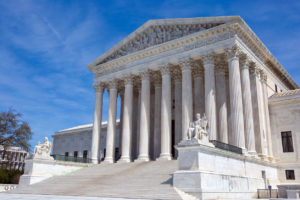
The United States Supreme Court announced on January 12, that it has granted certiorari and will hear a case related to state taxes – something that does not happen often! The High Court could finally settle an ongoing battle between e-retailers and states about how online purchases are taxed, and in the process may overturn a 1992 ruling which currently prevents states from collecting sales taxes on online purchases unless the seller has a physical presence in the state. An overhaul of this nature would change the state tax landscape significantly and require more online sellers to collect sales tax.
What’s happening?
Based on a long standing Supreme Court ruling from 1992 (Quill Corp. v. North Dakota), online retailers are not required to collect sales tax unless they have a physical presence (such as an office, inventory, or people) in a state. Over the past several years as online purchases have become prolific and states are losing sales tax revenue, the states have fought back by passing creative legislation to allow for collection of sales tax on online purchases. Several state legislatures have recently enacted laws referred to as “economic nexus” provisions, where a company creates nexus in a state by virtue of a minimum amount of sales revenue or instances of sales into a state, instead of looking to the physical presence threshold. Some states, like Colorado, have passed onerous reporting mechanisms to, in effect, report on their customers who may not be self-assessing use tax.
In 2016, South Dakota was one of the states which enacted a law requiring out-of-state online retail sellers to collect sales tax on sales to South Dakota customers if the total dollar amount of sales into the state was $100,000 or more OR the seller had at least 200 individual transactions into South Dakota within a year. After several challenges by sellers (including companies such as Wayfair, Overstock and eBay) and then the State, the South Dakota Supreme Court sided with the sellers, citing its necessity to rely on Quill. South Dakota then filed its petition with the US Supreme Court to hear the appeal. To date, 35 states support the petition and are eager to see if the US Supreme Court overturns Quill. Those of us in the industry have long been awaiting this development and many feel that this is the case that just might overturn Quill and the physical presence requirement to align more with the current e-tailing economy.
As such, the case of Wayfair Inc. v. South Dakota considers whether businesses will ultimately have to collect sales tax on online transactions. According to the Wall Street Journal, in recent years, the retail landscape has changed dramatically due to the growth of online retailers, which have undercut prices and hurt state governments with tax-free sales. Many in-state brick-and-mortar businesses are eager to see if Quill will be overturned, as they believe the current model hurts their revenues.
When?
The high court could hear oral arguments in the case as soon as April 2018. And if the Court decides to hear the case, a decision would be expected by the end of June of this year.
How could this impact you?
Individuals: If the Supreme Court decides to overturn Quill, more companies will be required to charge sales tax to consumers directly for on-line purchases. (Note that currently, consumers are already supposed to self-assess use tax if they purchase something online and the seller hasn’t charged sales tax. However, the reality is that very few of these purchases result in tax being sent to the state.) As such consumers would pay more tax out of pocket directly at point of sale.
On-line Retailers: Get ready to start filing in more states. You are currently not required to register, collect and file sales tax in a state if you don’t have physical presence there. If the Supreme Court overturns Quill, you will likely begin filing in many more states, as the economic thresholds already established are fairly low. More collecting means more sales tax returns and more compliance for your already stressed accounting department. You may want to consider getting help. Let us know!!
What’s next?
Stay tuned to find out what comes next. We’ll be running some additional articles discussing the possible ramifications of the case in future blogs! Check back regularly.
If you think this ruling might affect your business (and it likely may), don’t hesitate to call me at Miles Consulting Group. We are here to help with all of your multistate tax needs.



















